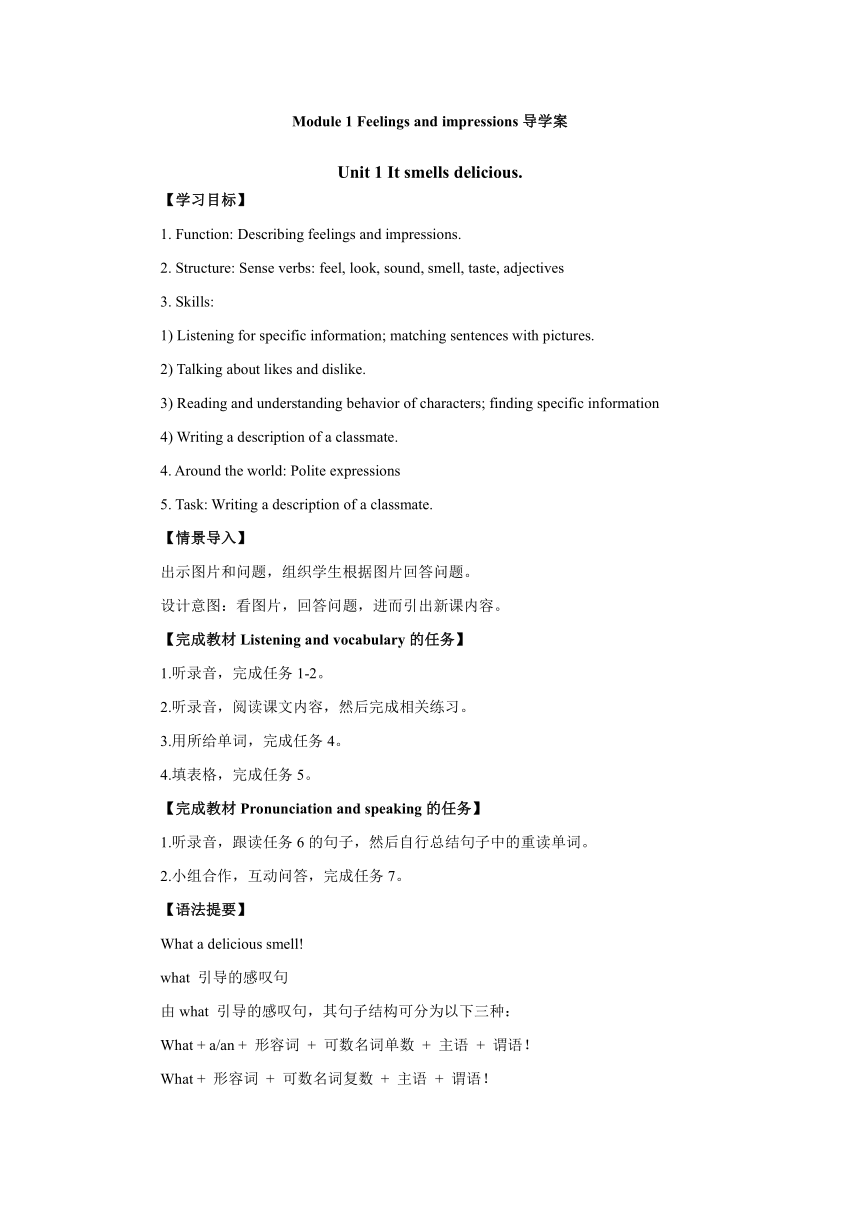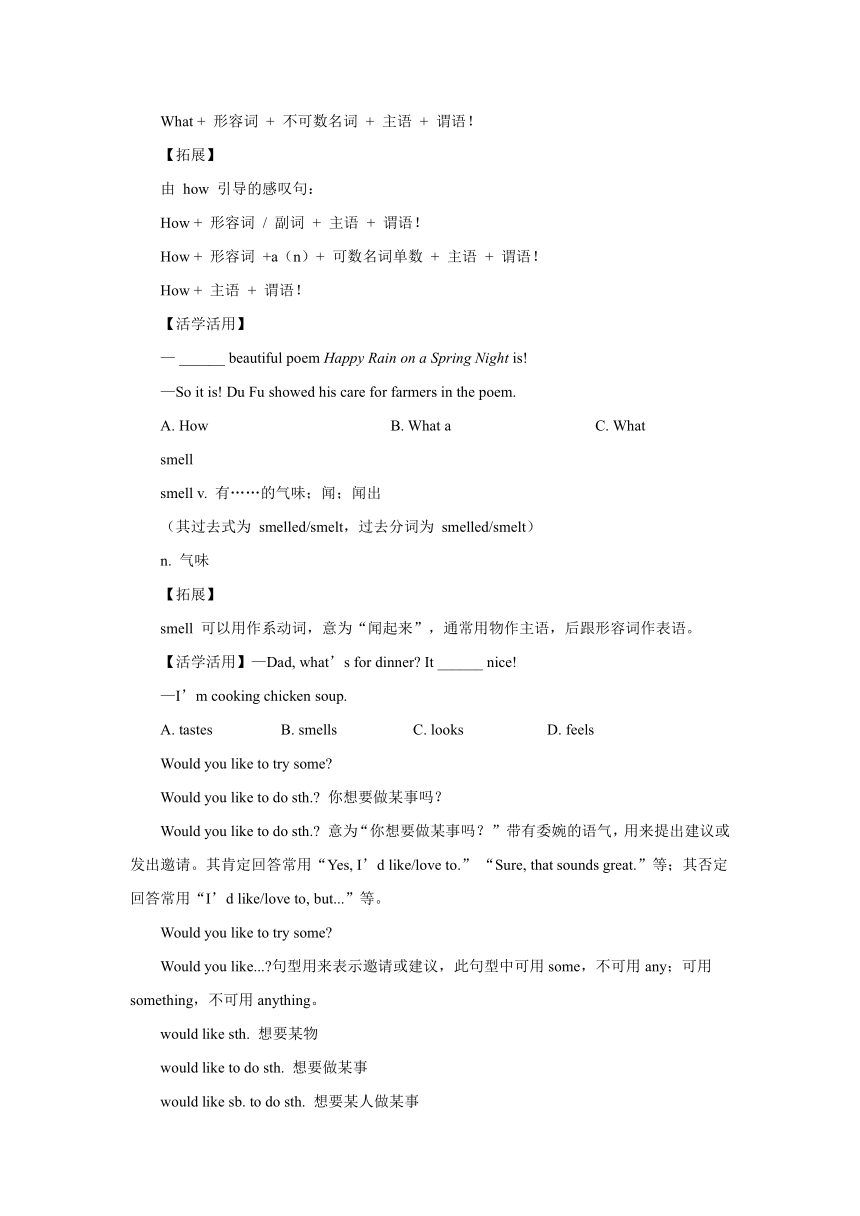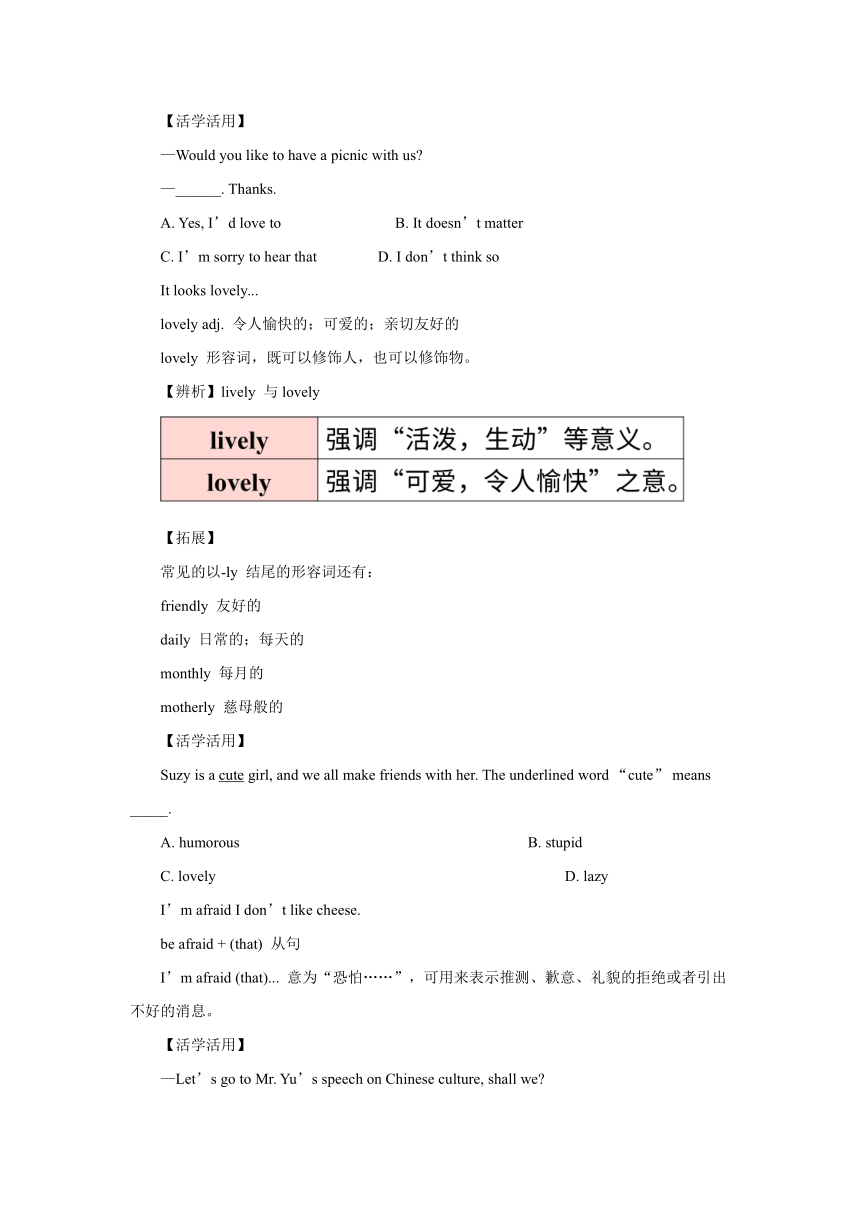外研版八年级下册Module 1 Feelings and impressions Unit1 导学案
文档属性
| 名称 | 外研版八年级下册Module 1 Feelings and impressions Unit1 导学案 |

|
|
| 格式 | docx | ||
| 文件大小 | 153.9KB | ||
| 资源类型 | 教案 | ||
| 版本资源 | 外研版 | ||
| 科目 | 英语 | ||
| 更新时间 | 2024-05-31 00:00:00 | ||
图片预览



文档简介
Module 1 Feelings and impressions导学案
Unit 1 It smells delicious.
【学习目标】
1. Function: Describing feelings and impressions.
2. Structure: Sense verbs: feel, look, sound, smell, taste, adjectives
3. Skills:
1) Listening for specific information; matching sentences with pictures.
2) Talking about likes and dislike.
3) Reading and understanding behavior of characters; finding specific information
4) Writing a description of a classmate.
4. Around the world: Polite expressions
5. Task: Writing a description of a classmate.
【情景导入】
出示图片和问题,组织学生根据图片回答问题。
设计意图:看图片,回答问题,进而引出新课内容。
【完成教材Listening and vocabulary的任务】
1.听录音,完成任务1-2。
2.听录音,阅读课文内容,然后完成相关练习。
3.用所给单词,完成任务4。
4.填表格,完成任务5。
【完成教材Pronunciation and speaking的任务】
1.听录音,跟读任务6的句子,然后自行总结句子中的重读单词。
2.小组合作,互动问答,完成任务7。
【语法提要】
What a delicious smell!
what 引导的感叹句
由what 引导的感叹句,其句子结构可分为以下三种:
What + a/an + 形容词 + 可数名词单数 + 主语 + 谓语!
What + 形容词 + 可数名词复数 + 主语 + 谓语!
What + 形容词 + 不可数名词 + 主语 + 谓语!
【拓展】
由 how 引导的感叹句:
How + 形容词 / 副词 + 主语 + 谓语!
How + 形容词 +a(n)+ 可数名词单数 + 主语 + 谓语!
How + 主语 + 谓语!
【活学活用】
— ______ beautiful poem Happy Rain on a Spring Night is!
—So it is! Du Fu showed his care for farmers in the poem.
A. How B. What a C. What
smell
smell v. 有……的气味;闻;闻出
(其过去式为 smelled/smelt,过去分词为 smelled/smelt)
n. 气味
【拓展】
smell 可以用作系动词,意为“闻起来”,通常用物作主语,后跟形容词作表语。
【活学活用】—Dad, what’s for dinner It ______ nice!
—I’m cooking chicken soup.
A. tastes B. smells C. looks D. feels
Would you like to try some
Would you like to do sth. 你想要做某事吗?
Would you like to do sth. 意为“你想要做某事吗?”带有委婉的语气,用来提出建议或发出邀请。其肯定回答常用“Yes, I’d like/love to.” “Sure, that sounds great.”等;其否定回答常用“I’d like/love to, but...”等。
Would you like to try some
Would you like... 句型用来表示邀请或建议,此句型中可用some,不可用any;可用something,不可用anything。
would like sth. 想要某物
would like to do sth. 想要做某事
would like sb. to do sth. 想要某人做某事
【活学活用】
—Would you like to have a picnic with us
—______. Thanks.
A. Yes, I’d love to B. It doesn’t matter
C. I’m sorry to hear that D. I don’t think so
It looks lovely...
lovely adj. 令人愉快的;可爱的;亲切友好的
lovely 形容词,既可以修饰人,也可以修饰物。
【辨析】lively 与lovely
【拓展】
常见的以-ly 结尾的形容词还有:
friendly 友好的
daily 日常的;每天的
monthly 每月的
motherly 慈母般的
【活学活用】
Suzy is a cute girl, and we all make friends with her. The underlined word “cute” means _____.
A. humorous B. stupid
C. lovely D. lazy
I’m afraid I don’t like cheese.
be afraid + (that) 从句
I’m afraid (that)... 意为“恐怕……”,可用来表示推测、歉意、礼貌的拒绝或者引出不好的消息。
【活学活用】
—Let’s go to Mr. Yu’s speech on Chinese culture, shall we
— _______ We can go next time.
A. Why not B. That’s all right.
C. Never mind. D. I’m afraid it’s too late.
It smells too strong and it tastes a bit sour.
a bit 一点儿;有点儿
【辨析】a bit 与 a little
【活学活用】
—Would you like to have something to eat
—Yes, please. I’m not ______ hungry.
A. a lot B. a bit
C. a few D. a little
Well, my chocolate cookies are done now.
be done 做好了,完成了
be done 意为“做好了,完成了”,其中done 为形容词,意为“做完的”。
【活学活用】
Cindy, you can go out to play after your homework is _____.
A. do B. does C. done D. doing
Have a try!
have a try 试试看,尝试一下
【拓展】
try 作动词,意为“尝试;设法;努力”。
try to do sth. 设法做某事
try doing sth. 尝试做某事
try one’s best (to do sth.)尽某人最大努力(做某事)
try on 试穿
【活学活用】 We should t our best to improve handwriting.
Apple pie sounds nice.
sound v. 听起来;令人觉得
feel 摸起来
look 看起来
smell 闻起来
taste 尝起来
sound 听起来
【辨析】sound 与sound like
【活学活用】
—Good news! The Shenzhou XIV manned spacecraft has been sent into space successfully.
—That _____ exciting and encouraging!
A. turns B. tastes
C. sounds D. smells
It might be salt!
might v. aux. 可能;也许
【拓展】常用的表推测的情态动词
might在形式上尽管是may 的过去式,但在表示推测时它并不表示过去。might 表示的可能性比may 表示的可能性要小。
【活学活用】
We ______ have a graduation ceremony next week, but I’m not sure.
A. must B. need C. might
It’s my lucky day!
lucky adj.(having good luck) 幸运的
lucky 形容词,在句中可以作表语或定语。
luck n. 运气
↓
lucky adj. 幸运的
↓
unlucky adj. 不幸的
↓
luckily adv. 幸运地
↓
unluckily adv. 不幸地
【活学活用】There was a car accident on Xinhua Road yesterday. ________, nobody was hurt.
A. Lucky B. Luckily
C. Unlucky D. Unluckily
It is my favourite.
favourite n. 最喜欢的人或事
favourite 也可作形容词,意为“最喜爱的”,常用于名词前作定语。
favourite 作形容词时,本身表示最高级含义,没有比较级和最高级形式。
Unit 1 It smells delicious.
【学习目标】
1. Function: Describing feelings and impressions.
2. Structure: Sense verbs: feel, look, sound, smell, taste, adjectives
3. Skills:
1) Listening for specific information; matching sentences with pictures.
2) Talking about likes and dislike.
3) Reading and understanding behavior of characters; finding specific information
4) Writing a description of a classmate.
4. Around the world: Polite expressions
5. Task: Writing a description of a classmate.
【情景导入】
出示图片和问题,组织学生根据图片回答问题。
设计意图:看图片,回答问题,进而引出新课内容。
【完成教材Listening and vocabulary的任务】
1.听录音,完成任务1-2。
2.听录音,阅读课文内容,然后完成相关练习。
3.用所给单词,完成任务4。
4.填表格,完成任务5。
【完成教材Pronunciation and speaking的任务】
1.听录音,跟读任务6的句子,然后自行总结句子中的重读单词。
2.小组合作,互动问答,完成任务7。
【语法提要】
What a delicious smell!
what 引导的感叹句
由what 引导的感叹句,其句子结构可分为以下三种:
What + a/an + 形容词 + 可数名词单数 + 主语 + 谓语!
What + 形容词 + 可数名词复数 + 主语 + 谓语!
What + 形容词 + 不可数名词 + 主语 + 谓语!
【拓展】
由 how 引导的感叹句:
How + 形容词 / 副词 + 主语 + 谓语!
How + 形容词 +a(n)+ 可数名词单数 + 主语 + 谓语!
How + 主语 + 谓语!
【活学活用】
— ______ beautiful poem Happy Rain on a Spring Night is!
—So it is! Du Fu showed his care for farmers in the poem.
A. How B. What a C. What
smell
smell v. 有……的气味;闻;闻出
(其过去式为 smelled/smelt,过去分词为 smelled/smelt)
n. 气味
【拓展】
smell 可以用作系动词,意为“闻起来”,通常用物作主语,后跟形容词作表语。
【活学活用】—Dad, what’s for dinner It ______ nice!
—I’m cooking chicken soup.
A. tastes B. smells C. looks D. feels
Would you like to try some
Would you like to do sth. 你想要做某事吗?
Would you like to do sth. 意为“你想要做某事吗?”带有委婉的语气,用来提出建议或发出邀请。其肯定回答常用“Yes, I’d like/love to.” “Sure, that sounds great.”等;其否定回答常用“I’d like/love to, but...”等。
Would you like to try some
Would you like... 句型用来表示邀请或建议,此句型中可用some,不可用any;可用something,不可用anything。
would like sth. 想要某物
would like to do sth. 想要做某事
would like sb. to do sth. 想要某人做某事
【活学活用】
—Would you like to have a picnic with us
—______. Thanks.
A. Yes, I’d love to B. It doesn’t matter
C. I’m sorry to hear that D. I don’t think so
It looks lovely...
lovely adj. 令人愉快的;可爱的;亲切友好的
lovely 形容词,既可以修饰人,也可以修饰物。
【辨析】lively 与lovely
【拓展】
常见的以-ly 结尾的形容词还有:
friendly 友好的
daily 日常的;每天的
monthly 每月的
motherly 慈母般的
【活学活用】
Suzy is a cute girl, and we all make friends with her. The underlined word “cute” means _____.
A. humorous B. stupid
C. lovely D. lazy
I’m afraid I don’t like cheese.
be afraid + (that) 从句
I’m afraid (that)... 意为“恐怕……”,可用来表示推测、歉意、礼貌的拒绝或者引出不好的消息。
【活学活用】
—Let’s go to Mr. Yu’s speech on Chinese culture, shall we
— _______ We can go next time.
A. Why not B. That’s all right.
C. Never mind. D. I’m afraid it’s too late.
It smells too strong and it tastes a bit sour.
a bit 一点儿;有点儿
【辨析】a bit 与 a little
【活学活用】
—Would you like to have something to eat
—Yes, please. I’m not ______ hungry.
A. a lot B. a bit
C. a few D. a little
Well, my chocolate cookies are done now.
be done 做好了,完成了
be done 意为“做好了,完成了”,其中done 为形容词,意为“做完的”。
【活学活用】
Cindy, you can go out to play after your homework is _____.
A. do B. does C. done D. doing
Have a try!
have a try 试试看,尝试一下
【拓展】
try 作动词,意为“尝试;设法;努力”。
try to do sth. 设法做某事
try doing sth. 尝试做某事
try one’s best (to do sth.)尽某人最大努力(做某事)
try on 试穿
【活学活用】 We should t our best to improve handwriting.
Apple pie sounds nice.
sound v. 听起来;令人觉得
feel 摸起来
look 看起来
smell 闻起来
taste 尝起来
sound 听起来
【辨析】sound 与sound like
【活学活用】
—Good news! The Shenzhou XIV manned spacecraft has been sent into space successfully.
—That _____ exciting and encouraging!
A. turns B. tastes
C. sounds D. smells
It might be salt!
might v. aux. 可能;也许
【拓展】常用的表推测的情态动词
might在形式上尽管是may 的过去式,但在表示推测时它并不表示过去。might 表示的可能性比may 表示的可能性要小。
【活学活用】
We ______ have a graduation ceremony next week, but I’m not sure.
A. must B. need C. might
It’s my lucky day!
lucky adj.(having good luck) 幸运的
lucky 形容词,在句中可以作表语或定语。
luck n. 运气
↓
lucky adj. 幸运的
↓
unlucky adj. 不幸的
↓
luckily adv. 幸运地
↓
unluckily adv. 不幸地
【活学活用】There was a car accident on Xinhua Road yesterday. ________, nobody was hurt.
A. Lucky B. Luckily
C. Unlucky D. Unluckily
It is my favourite.
favourite n. 最喜欢的人或事
favourite 也可作形容词,意为“最喜爱的”,常用于名词前作定语。
favourite 作形容词时,本身表示最高级含义,没有比较级和最高级形式。
同课章节目录
- Module 1 Feelings and impressions
- Unit 1 It smells delicious.
- Unit 2 I feel nervous when I speak Chinese .
- Unit 3 Language in use
- Module 2 Experiences
- Unit 1 I've also entered lots of speaking competi
- Unit 2 They have seen the Pyramids.
- Unit 3 Language in use
- Module 3 Journey to space
- Unit 1 Has it arrived yet?
- Unit 2 We have not found life on any other planet
- Unit 3 Language in use
- Module 4 Seeing the docto
- Unit 1 I haven't done much exercise since I got m
- Unit 2 We have played football for a year now
- Unit 3 Language in use
- Module 5 Cartoons
- Unit 1 It's time to watch a cartoon.
- Unit 2 Tintin has been popular for over eighty yea
- Unit 3 Language in use
- Revision module A
- Module 6 Hobbies
- Unit 1 Do you collect anything ?
- Unit 2 Hobbies can make you grow as a person.
- Unit 3 Language in use
- Module 7 Summer in Los Angeles
- Unit 1 Please write to me and send me some photos
- Unit 2 Fill out a form and come to learn English
- Unit 3 Language in use
- Module 8 Time off
- Unit 1 I can hardly believe we are in the city ce
- Unit 2 We thought somebody was moving about
- Unit 3 Language in use
- Module 9 Friendship
- Unit 1 Could I ask if you've mentioned this to he
- Unit 2 I believe that the world is what you think
- Unit 3 Language in use
- Module 10 On the radio
- Unit 1 I hope that you can join us one day
- Unit 2 It seemed that they were speaking to me in
- Unit 3 Language in use
- Revision module B
